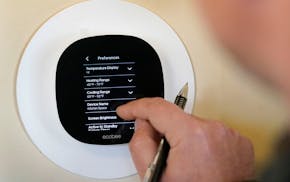MinuteClinic is branching out.
The retail clinic pioneer, which grew into the nation's biggest chain of walk-in clinics with its limited menu of treatments for minor problems -- pink eye, flu, ear infections -- earlier this month launched a new service to monitor chronic conditions.
MinuteClinic chief Dr. Andrew Sussman talked to the Star Tribune about the new "Monitoring Made Easy" program and where he's taking MinuteClinic in the era of health reform.
Sussman, 45, was appointed president and chief operating officer of MinuteClinic in July, after stints as chief operating officer of UMass Memorial Medical Center and chief medical officer of Brigham and Women's Physician Organization in Boston.
MinuteClinic, which started in the Twin Cities 10 years ago as QuickMedx, is now part of Woonsocket, R.I.-based CVS Caremark Corp. It has 570 clinics around the country.
Q Your new chronic disease monitoring program appears a departure from the original MinuteClinic model with its limited menu, no appointments and not much continuity of care.
A MinuteClinic has been successful on three principles: quality, good access to care -- we're open seven days a week and you can walk in with no appointment -- and affordable prices.
Our health monitoring services are for patients diagnosed with diabetes, high cholesterol, asthma and high blood pressure. We provide care and lab tests, give patients the tests immediately and collaborate with the patient's medical homes. It's the same principles: high quality care, great access, reasonable prices.
Q Do you need to have a partnership with a primary care provider before monitoring a patient?
A No. About half of our patients do not have a primary care provider. There's a fair amount of medical homelessness. We're an important point of contact. We don't do everything but we can help them to get hooked up with a medical system.
Q Similar to your partnership with Allina Hospitals and Clinics here in the Twin Cities?
A We see our role as complementary to the established infrastructure. We also have a relationship with the Cleveland Clinic and are fairly close to announcing a series of other relationships. We aim to give patients a wraparound care experience. We'll share a medical director, share medical records with those partners.
Q The problem with retail clinics is they're a seasonal business with spikes during flu season and very little in between. It's been hard for operators to make money. Do you see chronic disease monitoring as a way to even out that seasonality? Are you profitable?
A Some services are seasonal and some are not. We are establishing our portfolio of services, and "Monitoring Made Easy" is an example of that. We are looking for other opportunities down the road. As for profitability, we've talked about achieving break-even by the end of 2011. Traffic was up 49 percent in the fourth quarter [vs. a year ago] on a same-clinic basis. There are a lot of patients out there.
Q I'm intrigued by the lineup of MinuteClinic CEOs so far. You had Michael Howe, who came from the fast-food world, followed by Chip Phillips, who came from the pharmacy world, and now you, a doctor who comes squarely from the traditional health care world. What does this say about MinuteClinic's ambitions?
A I come with great excitement for delivering health care services in new ways that meet patients' needs, that's accessible, affordable. Right now, that's what our country needs.
Our model is going to have a role going forward based on the aging population and epidemic of chronic disease. Health reform is going to drive access to care. Many patients who don't have insurance are going to get insured. On a national level, the shortage of primary care doctors is potentially going to be exacerbated.
Prevention and primary care are things MinuteClinic is focused on. As a physician, this really appeals to me -- to provide health care to people that might not get it otherwise.
Chen May Yee • 612-673-7434
Starbucks takes on the federal labor agency before the US Supreme Court
Stock market today: Wall Street poised to open with gains as corporate earnings reports pour in

